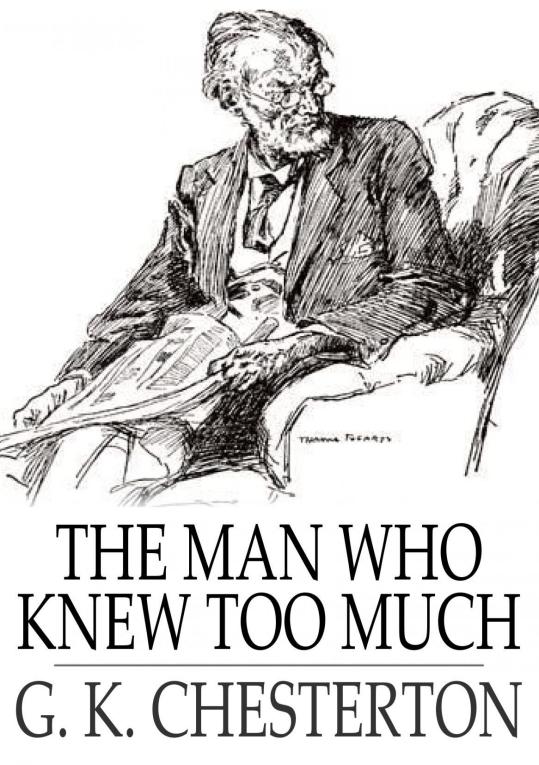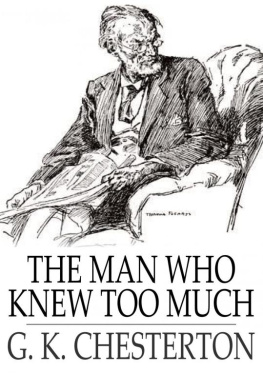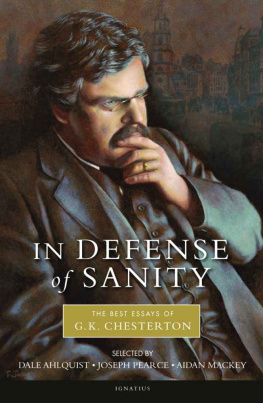Gilbert K. Chesterton - The Man Who Knew Too Much
Here you can read online Gilbert K. Chesterton - The Man Who Knew Too Much full text of the book (entire story) in english for free. Download pdf and epub, get meaning, cover and reviews about this ebook. year: 2009, publisher: Floating Press, genre: Art. Description of the work, (preface) as well as reviews are available. Best literature library LitArk.com created for fans of good reading and offers a wide selection of genres:
Romance novel
Science fiction
Adventure
Detective
Science
History
Home and family
Prose
Art
Politics
Computer
Non-fiction
Religion
Business
Children
Humor
Choose a favorite category and find really read worthwhile books. Enjoy immersion in the world of imagination, feel the emotions of the characters or learn something new for yourself, make an fascinating discovery.
- Book:The Man Who Knew Too Much
- Author:
- Publisher:Floating Press
- Genre:
- Year:2009
- Rating:4 / 5
- Favourites:Add to favourites
- Your mark:
- 80
- 1
- 2
- 3
- 4
- 5
The Man Who Knew Too Much: summary, description and annotation
We offer to read an annotation, description, summary or preface (depends on what the author of the book "The Man Who Knew Too Much" wrote himself). If you haven't found the necessary information about the book — write in the comments, we will try to find it.
The Man Who Knew Too Much — read online for free the complete book (whole text) full work
Below is the text of the book, divided by pages. System saving the place of the last page read, allows you to conveniently read the book "The Man Who Knew Too Much" online for free, without having to search again every time where you left off. Put a bookmark, and you can go to the page where you finished reading at any time.
Font size:
Interval:
Bookmark:


The Man Who Knew Too Much
First published in 1922.
ISBN 978-1-775416-52-4
2009 THE FLOATING PRESS.
While every effort has been used to ensure the accuracy and reliability of the information contained in The Floating Press edition of this book, The Floating Press does not assume liability or responsibility for any errors or omissions in this book. The Floating Press does not accept responsibility for loss suffered as a result of reliance upon the accuracy or currency of information contained in this book. Do not use while operating a motor vehicle or heavy equipment. Many suitcases look alike.
Visit www.thefloatingpress.com
Harold March, the rising reviewer and social critic, was walkingvigorously across a great tableland of moors and commons, thehorizon of which was fringed with the far-off woods of the famousestate of Torwood Park. He was a good-looking young man in tweeds,with very pale curly hair and pale clear eyes. Walking in wind andsun in the very landscape of liberty, he was still young enough toremember his politics and not merely try to forget them. For hiserrand at Torwood Park was a political one; it was the place ofappointment named by no less a person than the Chancellor of theExchequer, Sir Howard Horne, then introducing his so-calledSocialist budget, and prepared to expound it in an interview with sopromising a penman. Harold March was the sort of man who knowseverything about politics, and nothing about politicians. He alsoknew a great deal about art, letters, philosophy, and generalculture; about almost everything, indeed, except the world he wasliving in.
Abruptly, in the middle of those sunny and windy flats, he came upona sort of cleft almost narrow enough to be called a crack in theland. It was just large enough to be the water-course for a smallstream which vanished at intervals under green tunnels ofundergrowth, as if in a dwarfish forest. Indeed, he had an oddfeeling as if he were a giant looking over the valley of thepygmies. When he dropped into the hollow, however, the impressionwas lost; the rocky banks, though hardly above the height of acottage, hung over and had the profile of a precipice. As he beganto wander down the course of the stream, in idle but romanticcuriosity, and saw the water shining in short strips between thegreat gray boulders and bushes as soft as great green mosses, hefell into quite an opposite vein of fantasy. It was rather as if theearth had opened and swallowed him into a sort of underworld ofdreams. And when he became conscious of a human figure dark againstthe silver stream, sitting on a large boulder and looking ratherlike a large bird, it was perhaps with some of the premonitionsproper to a man who meets the strangest friendship of his life.
The man was apparently fishing; or at least was fixed in afisherman's attitude with more than a fisherman's immobility. Marchwas able to examine the man almost as if he had been a statue forsome minutes before the statue spoke. He was a tall, fair man,cadaverous, and a little lackadaisical, with heavy eyelids and ahighbridged nose. When his face was shaded with his wide white hat,his light mustache and lithe figure gave him a look of youth. Butthe Panama lay on the moss beside him; and the spectator could seethat his brow was prematurely bald; and this, combined with acertain hollowness about the eyes, had an air of headwork and evenheadache. But the most curious thing about him, realized after ashort scrutiny, was that, though he looked like a fisherman, he wasnot fishing.
He was holding, instead of a rod, something that might have been alanding-net which some fishermen use, but which was much more likethe ordinary toy net which children carry, and which they generallyuse indifferently for shrimps or butterflies. He was dipping thisinto the water at intervals, gravely regarding its harvest of weedor mud, and emptying it out again.
"No, I haven't caught anything," he remarked, calmly, as ifanswering an unspoken query. "When I do I have to throw it backagain; especially the big fish. But some of the little beastsinterest me when I get 'em."
"A scientific interest, I suppose?" observed March.
"Of a rather amateurish sort, I fear," answered the strangefisherman. "I have a sort of hobby about what they call 'phenomenaof phosphorescence.' But it would be rather awkward to go about insociety carrying stinking fish."
"I suppose it would," said March, with a smile.
"Rather odd to enter a drawing-room carrying a large luminous cod,"continued the stranger, in his listless way. "How quaint it wouldbe if one could carry it about like a lantern, or have little spratsfor candles. Some of the seabeasts would really be very pretty likelampshades; the blue sea-snail that glitters all over likestarlight; and some of the red starfish really shine like red stars.But, naturally, I'm not looking for them here."
March thought of asking him what he was looking for; but, feelingunequal to a technical discussion at least as deep as the deep-seafishes, he returned to more ordinary topics.
"Delightful sort of hole this is," he said. "This little dell andriver here. It's like those places Stevenson talks about, wheresomething ought to happen."
"I know," answered the other. "I think it's because the placeitself, so to speak, seems to happen and not merely to exist.Perhaps that's what old Picasso and some of the Cubists are tryingto express by angles and jagged lines. Look at that wall like lowcliffs that juts forward just at right angles to the slope of turfsweeping up to it. That's like a silent collision. It's like abreaker and the back-wash of a wave."
March looked at the low-browed crag overhanging the green slope andnodded. He was interested in a man who turned so easily from thetechnicalities of science to those of art; and asked him if headmired the new angular artists.
"As I feel it, the Cubists are not Cubist enough," replied thestranger. "I mean they're not thick enough. By making thingsmathematical they make them thin. Take the living lines out of thatlandscape, simplify it to a right angle, and you flatten it out to amere diagram on paper. Diagrams have their own beauty; but it is ofjust the other sort. They stand for the unalterable things; thecalm, eternal, mathematical sort of truths; what somebody calls the'white radiance of'"
He stopped, and before the next word came something had happenedalmost too quickly and completely to be realized. From behind theoverhanging rock came a noise and rush like that of a railway train;and a great motor car appeared. It topped the crest of cliff, blackagainst the sun, like a battle-chariot rushing to destruction insome wild epic. March automatically put out his hand in one futilegesture, as if to catch a falling tea-cup in a drawing-room.
For the fraction of a flash it seemed to leave the ledge of rocklike a flying ship; then the very sky seemed to turn over like awheel, and it lay a ruin amid the tall grasses below, a line of graysmoke going up slowly from it into the silent air. A little lowerthe figure of a man with gray hair lay tumbled down the steep greenslope, his limbs lying all at random, and his face turned away.
The eccentric fisherman dropped his net and walked swiftly towardthe spot, his new acquaintance following him. As they drew nearthere seemed a sort of monstrous irony in the fact that the deadmachine was still throbbing and thundering as busily as a factory,while the man lay so still.
Font size:
Interval:
Bookmark:
Similar books «The Man Who Knew Too Much»
Look at similar books to The Man Who Knew Too Much. We have selected literature similar in name and meaning in the hope of providing readers with more options to find new, interesting, not yet read works.
Discussion, reviews of the book The Man Who Knew Too Much and just readers' own opinions. Leave your comments, write what you think about the work, its meaning or the main characters. Specify what exactly you liked and what you didn't like, and why you think so.





